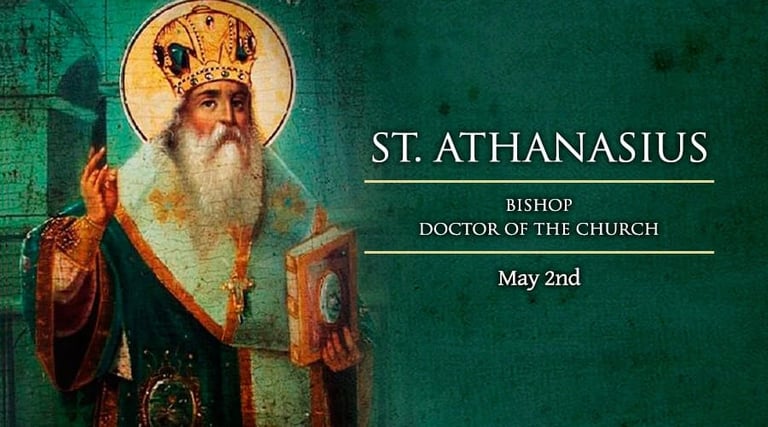Saint of the day May 2, 2025
St. Athanasius
DAILY SAINT
Nirmala Josephine
5/2/20253 min read


St.Athanasius was born in 297 in Alexandria, Egypt, at the end of the Roman persecution of Christians and at the start of the ascension of the Emperor Constantine. His parents were Christians, and he received an excellent education. He learned the Scriptures inside and out, and for a time, he followed St. Anthony the Great, who established a life of prayer in the desert.
Athanasius was ordained a deacon at the age of 21 and was assigned as a secretary to the bishop of Alexandria. It was in this role as an aid to the bishop that Athanasius attended the great council of Nicea, which gave us the Nicene Creed that we still recite at Mass today.
The council was called because of the rapid spread of a strain of thought—named Arianism, after its first teacher, Arius—which claimed that because Jesus was born as a man, he could not have existed before his birth, and therefore was not fully divine. The council definitively stated that Jesus was, in fact, divine and had existed as part of the Trinity before the Incarnation. The bishops condemned Arius and articulated the creed as a standard of orthodoxy.
Shortly after the council, the bishop died, and Athanasius was appointed his successor, even though he was not even 30 years old. Arianism, despite its condemnation, was still a popular belief, and Athanasius spent most of the rest of his life dealing with that heresy.
He steadfastly proclaimed the conclusions of the council, even in the face of threats. His Arian opponents accused him of treason and even murder. Because they had connections to powerful people in the empire, they succeeded in having Athanasius removed and exiled. Political maneuvers resulted in his restoration and exile several more times—by the end of his life, he had been banished five times and spent 17 years in exile. He was a constant thorn in the side of the powerful who wanted a more convenient version of Christianity, and for this reason, he was called the “Champion of Orthodoxy.
Reflection
Romans 8:28 states, “We know that all things work for good for those who love God, who are called according to his purpose.” This Scripture was certainly fulfilled in the life of Saint Athanasius. During his five exiles, he wrote over fifty letters that have survived, numerous works on the faith, and the first detailed biography of a saint, Saint Anthony of the Desert. His book on Saint Anthony was based on his firsthand knowledge of the life of this desert monk. It is believed that Athanasius spent at least a year with Anthony prior to Anthony’s death, and then spent five or six more years with the community of desert monks Anthony had helped to form. Athanasius’s knowledge of this unique vocation and his participation in it gave the early Church a powerful witness of the vocation of solitude and prayer. His book became one of the most copied books of that time and remains very popular today. There is little doubt that that work alone contributed greatly to an understanding of the contemplative life not only of desert monks, but also for religious, clergy, and laity. Additionally, Athanasius’s other works not only eventually led to the complete repudiation of the Arian heresy but also provided theologians since that time with treasured insights into the faith, especially into the Incarnation and divinity of Christ.
As we honor this great Doctor of the Church, ponder especially his unwavering devotion to the truth, despite enduring lifelong persecution for it. It would have been easier for him to remain silent, but he did not. If you find yourself compromising your faith at times, take inspiration from Saint Athanasius and seek his intercession today.
